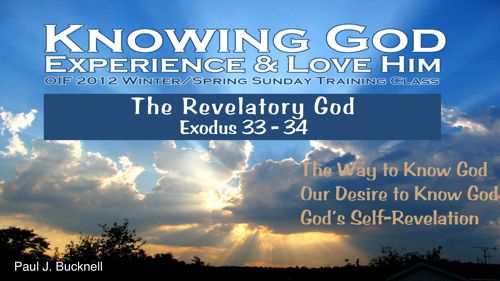
Knowing God: Experience & Love Him
Paul J. Bucknell
Series Introduction| Knowing God | The Revelatory God
Way to Know God | God's Facebook | Purpose of Life | Distortion of Good Works | Spiritual Development | Desire to Know God | Call Upon | Exodus 34:6-7 | God's Character | God and Religions
Chapter #2 The Revelatory God: Handout pdf | Video
For pdf | epub | ppt | Audio mp3, check out the D3 Library
God’s Self-Revelation (Exodus 34:6-7)
Purpose: People introduce themselves through their accomplishments but God is very different. We get to get a real picture of what makes God tick here in Exodus 34:6-7, that is, through the Lord's character.
God’s holy person is best seen through His own introduction. The world’s religions are a poor guessing game of who God is and how He practically influences them.
“Then the LORD passed by in front of him and proclaimed, “The LORD, the LORD God, compassionate and gracious, slow to anger, and abounding in lovingkindness and truth; 7 who keeps lovingkindness for thousands, who forgives iniquity, transgression and sin; yet He will by no means leave the guilty unpunished, visiting the iniquity of fathers on the children and on the grandchildren to the third and fourth generations” (Exodus 34:6-7).
Questions on Exodus 34:6-7
Let’s first ask some questions from this passage.
-
Who is speaking in Exodus 34:6-7? How does he name or entitle Himself?
-
What adjectives does the Lord use to describe God in verse 6?
-
How does the Lord further describe Himself in verse 7?
-
Try grouping these descriptions in two or three categories. What do you learn from this list?
God’s glorious person
If we were to introduce ourselves, we would probably speak of our accomplishments both in terms of studies, where we lived, how we traveled, about our family and our work. We tend to point to what we have productively done rather than the time we wasted. God doesn’t take that line.
The Lord briefly but powerfully explains His person, attribute after attribute (much like the approach of this series).
Instead of speaking about His works, He speaks of His person. It is God’s holy person that stands behind all of His works. Who a person is says more ultimately about a person than His works. Let me give you an example.
The Lord the Creator
Take God as Creator. This creation of His speaks much about His power (Notice that the Lord did not mention this. Maybe Moses was already convinced of this). More important than this creative ability, however, is what God will do with the creation.
This is the problem we have in the field of ethics today. Man is going a long way in developing fantastic technologies, but one thing history teaches us: do not trust man with power and knowledge for some will use if for evil purposes.
Video capability. Will men use their pictures to show things that ought to be seen?
Cloning power. Men are merging sheep and men to clone organs. Where will this lead?
Detection ability. Will men use the ability to spy to do evil?
Genetic capability. Men are manipulating seeds, mosquitos, foods. Do they always have pure intentions? Will they induce barrenness among the ‘undesirables’?
Power capability. Men use or threaten others with guns, viruses, nuclear bombs to get what they want.
Should we really trust man? No. We have proved the lack of character.
Character is more revealing
Character is more important than productivity because it shapes the person’s abilities and resources. Because of inconsistent character, or the lack of it, man cannot be trusted. Power must be limited.
God reveals the part of His person that helps know how He uses His knowledge, power, eternity, etc. This knowledge of God is not magic where one gains control over other forces. It is relationship knowledge.
I know God and what He is like therefore I can approach Him on certain matters. Expand your thinking on how God works with man on how a couple work together making decisions.
A great example of this is when the Lord hinted at what He would be doing at Sodom. It was an invitation to Abraham to work with the Lord there. It is this same desire of God to work with us that had Jesus present us the opportunity to ask anything we wish.
“If you abide in Me, and My words abide in you, ask whatever you wish, and it will be done for you” (John 15:7).
This looks rather odd that God Almighty would enable us to influence what happens through speaking with Him. God enables us to know Him so that we can have Him do what we suggest. This is all based on relationship, “If you abide in Me, and My words abide you.”
God’s revelation of His true person enable and encourage us to make certain proposals to Him. “Lord, are you not like ...., then do ....” God has always wanted His people to work alongside Him in this way.
=> Angels appear to Abraham (Genesis 18)
Questions
Modern education pledges to provide knowledge without being influenced by the touch of religion (think: moral guidance). What ramifications has and will this have on our world? This question has a huge answer, but just provide a few answers from your experience.
-
What character attributes do you live by? How consistent are you?
-
When does inconsistency in displaying an attribute no longer become an attribute? (For example, what if God was 95% faithful. Would He still be considered faithful?)
info@foundationsforfreedom.net
Scriptures typically quoted from the New American Standard Bible unless noted:
(C) Copyright The Lockman Foundation 1988










